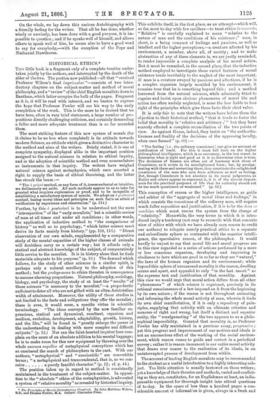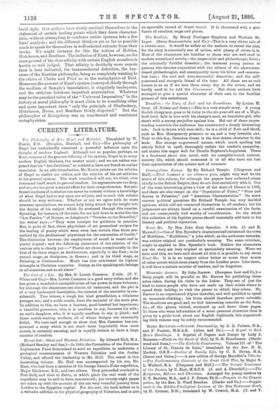HISTORICAL ETHICS.*
THIS little book is a fragment only of a complete treatise under- taken jointly by the authors, and interrupted by the death of the elder of the two. The portion now published—all that " received Professor Wilson's final imprimatur"—consists of two intro- ductory chapters on the subject-matter and method of moral philosophy, and a "review " of the chief English moralists down to Bentham, which latter occupies the bulk of the pages. Fragment
as it is, it will be read with interest, and we hasten to express the hope that Professor Fowler will see his way to the early completion of the work. This is the more to be desired that we have here, often in very brief statement, a large number of pro- positions directly challenging criticism, and certainly demanding a fuller and more adequate treatment than is so far accorded them.
The most striking feature of this new system of morals (for it claims to be no less when completed) is its attitude towards modern Science, an attitude which gives a distinctive character to the method and aims of the writers. Briefly stated, it is one of complete sympathy, displayed alike in the important position assigned to the natural sciences in relation to ethical inquiry, and in the adoption of scientific method and even nomenclature as instruments in that inquiry. The writers have weighed natural science against metaphysics, which once asserted a right to supply the basis of ethical theorising, and the latter has struck the beam :-
" The a priori method, or any form of it, transcendental or intuitive, we deliberately set aside. All such methods appear to us to take for granted what requires explanation or proof, and to be incapable of establishing a satisfactory system of morale. We adopt an a posteriori method, basing moral ideas and principles on such facts as admit of verification by experience and observation." (p. 114.)
Further, by this i posteriori is to be understood not the mere introspection " of the " early moralists," but a scientific review of man at all times and under all conditions ; in other words, the application of inductive method to "the comparisons of history" as well as to psychology, " which latter science must derive its facts mainly from history." (pp. 128, 116.) " Direct observation of our own minds, supplemented by a comparative study of the mental capacities of the higher classes of animals, will doubtless carry us a certain way ; but it affords only a statical and abstract knowledge of the subject, of comparatively little service to the moralist. It is in history alone that he finds materials adequate to his purpose." (p. 10.) The demand which follows, for the study of other sciences in a similar spirit, is perhaps only a natural corollary to the adoption of this method ; but the prolegomena to ethics threaten in consequence to assume alarming proportions. Natural philosophy, sociology, biology, and psychology, the study of at least the " results " of these sciences "is necessary to the moralist,"—a propmdentic sufficient to deter all who are not gifted with an ultra-Aristotelian width of attainment. Moreover, the utility of these studies is not limited to the facts and colligations they offer the moralist ; there is even, it would seem, a specific virtue in scientific terminology. "The ideas conveyed by the now familiar ex- pressions, statical and dynamical, resultant, organism and medium, evolution, development, adaptability, growth, history, and the like," will be found to "greatly enlarge the power of the understanding in dealing with more complex and difficult subjects." (p. 12.) Nor can the faint-hearted inquirer here com- plain on the score of an absolute addition to his mental baggage ; he is to make room for this new equipment by throwing over the whole onerosa supellex of metaphysical conceptions which has so cumbered the march of philosophers in the past. With our authors, " metaphysical " and " unscientific " are convertible terms ; " a metaphysical and transcendental, that is, as we con- ceive a purely fanciful character." (p. 12 ; cf. p. 44.) The position taken up in regard to method is consistently maintained in the treatment of the subject-matter. In opposi- tion to the " absolute " ethics of the metaphysician, is advocated a system of "relative morality" as revealed by historical inquiry.
• The Principks of Morals (Introductory Chapters). Bs John Matthias Wilson, B.D., and Thomas Fowler, M.A. Oxford: Clarendon Press.
This exhibits itself, in the first place, as an attempt—which will, so far, meet to-day with few cavillers—to treat ethics in concreto. " Relative " is carefully explained to mean "relative to the nature of man and the conditions of his existence ;" man, in short, is a being compact of feelings and passions, as well as intellect and the higher perceptions,—a creature affected by his environment, a member, above all, of society ; and to make abstraction of any of these elements is, we are justly reminded, to render impossible a complete analysis of his moral action. But it must be remarked, in the second place, that the inductive method employed to investigate these varied features of moral existence tends inevitably to the neglect of the most important. If man is a creature swayed by passions and affections, if he is a complex organism largely moulded by his environment, it remains true that he is something beyond this ; and a method borrowed from the natural sciences, while admirably fitted to cognise and insist upon obvious phenomena of moral life and action too often unduly neglected, is none the less liable to lose sight of the principles which give these facts their chief value.
It is only fair to note that the writers have before them the objection to their historical method, "that it tends to foster the belief that morality is relative and arbitrary ;' " but they have scarcely effected a complete reconciliation of the two points of view. As against Hume, indeed, they insist on "the authorita- tiveness and finality of the decisions of the approving faculty, when once formed" (p. 60) :- " The feeling [ix , the ordinary conscience] can give no account or justification of itself. For this it must fall back on the higher philosophical intelligence, which is as necessary, in the last resort, to determine what is right and good as it is to determine what is true. The decisions of Reason are often out of harmony with those of Conscience, as it exists in its unenlightened form ; but, by amalga- mating with them and correcting them, they constitute the enlightened conscience of the man who acts from reflection as well as feeling. But, though Conscience is not absolute in its moral judgments, as Butler and others appear to represent it, it is of the utmost import- ance for the practical purposes of life that its authority should not be too much questioned or weakened." (p. 55.)
This conception of reason or the higher intelligence, as guide and arbiter of the " aggregate of moral ideas and feelings," in which consists the conscience of the ordinary man, will require much fuller exposition and justification, if it is to be the (lens ex maxhina which must rescue the system from the charge of " relativity." Meanwhile, the very terms in which it is intro- duced imply a tendency (not easy to reconcile with that concrete view of ethics with which we have already seen reason to credit our authors) to relegate merely practical ethics to a separate and subordinate sphere as contrasted with the superior intelli- gence, the speculative reason, of the philosopher. It would
hardly be nnjast to say that moral life and moral progress are in this view regarded as a series of actions performed by a more or less conscious organism, developing and improving in obedience to laws which are good in so far as they are " natural," the laws of the human organism and its environment; while beyond this sphere of unreasoned morality is the reason, dwelling serene and apart, and appealed to only "in the last resort" as the supreme test and justification of that morality. Against this view we would urge that moral action differs from all other " phenomena " of which science is cognisant, precisely in its rational consciousness of a law imposed on it from the beginning by its own nature ; if the reason is not throughout animating and informing the whole moral activity of man, wherein it finds its own chief manifestation, if it is only a repository of prin- ciples, supplying that activity with an ultimate criterion and measure of right and wrong, but itself a distinct and superior entity, the " amalgamating " of the two appears to us a philo- sophical impossibility. Granted that morality is, as Professor Fowler has ably maintained in a previous essay, progressive ; yet this progreso and improvement of our motives and ideals is not an unconscious effect of the working of the social environ- ment, which reason comes to guide and correct in a periodical survey ; rather it is reason immanent in our entire moral activity that draws ever nearer to the realisation of its ideals, in an uninterrupted process of development from within.
The account of leading English moralists may be recommended to the student as a useful introduction to a highly interesting sub- ject. Too little attention is usually bestowed on these writers ; yet a knowledge of their theories and methods, varied and conflict- ing as they are, constitutes, for an Englishman at least, an indis- pensable equipment for thorough insight into ethical questions of to-day. In the space of less than a hundred pages a con- siderable amount of informat'on is given, always in a fresh and lucid style. Our authors have wisely confined themselves to the statement of certain leading points which they deem character- istic, without attempting to condense entire systems into a few lines' analysis ; and the different thinkers are as far as possible made to speak for themselves in well-selected extracts from their works. We might instance for this the notices of Hobbes, Hutcheson, and Bentham. The inclusion of Kant, however, on the mere ground of his close affinity with certain English moralists is hardly so well judged. That affinity is decidedly more remote than is here indicated, the transcendental deduction, the key- stone of the Kantian philosophy, being as completely wanting to the ethics of Clarke and Price as to the metaphysics of Reid. Moreover, the account of Kant's system (conveyed chiefly through the medium of Semple's translation), is singularly inadequate, and the criticism betokens imperfect appreciation. Whatever may be the practical value of the " Universal Imperative," in the history of moral philosophy it must claim to be something other and more important than "only the principle of Shaftesbury, Hutcheson, Hume, and Bentham thinly disguised." But the philosopher of Konigsberg was an unashamed and consistent metaphysician.



































 Previous page
Previous page